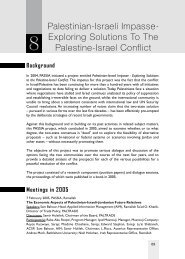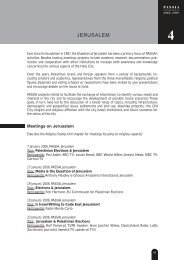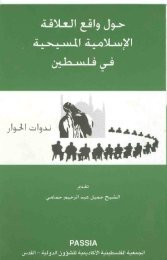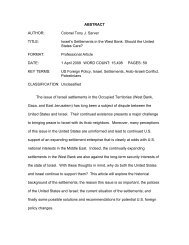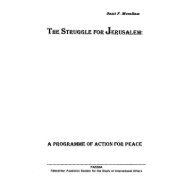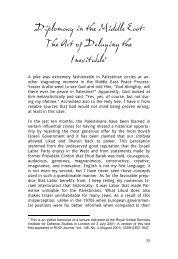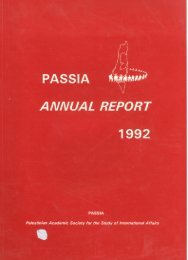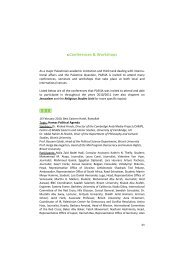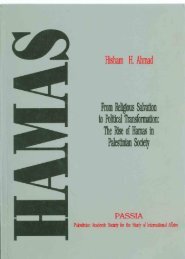FINLAND & PALESTINE Proceedings of a Joint Workshop
FINLAND & PALESTINE Proceedings of a Joint Workshop
FINLAND & PALESTINE Proceedings of a Joint Workshop
You also want an ePaper? Increase the reach of your titles
YUMPU automatically turns print PDFs into web optimized ePapers that Google loves.
(4) In line with the analysis and terminology <strong>of</strong> Oren Yiftachel,<br />
Nadim Rouhana and As'ad Ghanem, the present state <strong>of</strong><br />
Israel is not labeled as a democracy but as an "ethnocracy."l<br />
The formal and non-formal identity <strong>of</strong> Israel as a Jewish<br />
state is identified as the root cause <strong>of</strong> the inequality suffered<br />
by the Israeli-Palestinians. As long as this identity is<br />
maintained, real equality is impossible.<br />
(5) Based on this analysis, the vision documents call for a pr<strong>of</strong>ound<br />
reformation <strong>of</strong> the Israeli state. All <strong>of</strong> the documents<br />
agree that Israel should cease to be a Jewish state. They <strong>of</strong>fer<br />
a number <strong>of</strong> envisioned outcomes <strong>of</strong> this transformation.<br />
These include "consociational democracy" (consensus<br />
democracy) in the Future Vision, Ita bi-national state" (the<br />
Haifa Declaration), or a "bilingual and multicultural state"<br />
(the Democratic Constitution).14<br />
The last point is without a doubt the most important new element<br />
in the vision documents. According to the Future Vision,<br />
only consensus democracy would guarantee both individual<br />
and collective rights. Accordingly, in addition to their full civil<br />
rights, Palestinian Arabs need self-rule or autonomy in terms <strong>of</strong><br />
education, culture, religion, and language. Further, the document<br />
calls for a chance to "create national institutions relating<br />
to all domains <strong>of</strong> life." It also states that the two groups<br />
"should have mutual right to veto and self-administration, II and<br />
that Israel should recognize the complete equality <strong>of</strong> the Palestinians<br />
on "a collective-national basis." The Democratic Constitution<br />
proposes a far more concrete vision in this respect. In its<br />
important paragraph 20 on power-sharing in decision-making,<br />
it proposes several possible models by which representatives<br />
<strong>of</strong> the Palestinian minority may veto any bill which, in their<br />
opinion, violates the fundamental rights <strong>of</strong> the Arab minority.<br />
13 See e.g. Yiftachel 2006 and Ghanem, Rouhana & Yiftachel1998.<br />
14 Waxman & Peleg, 2008, 62.<br />
94



